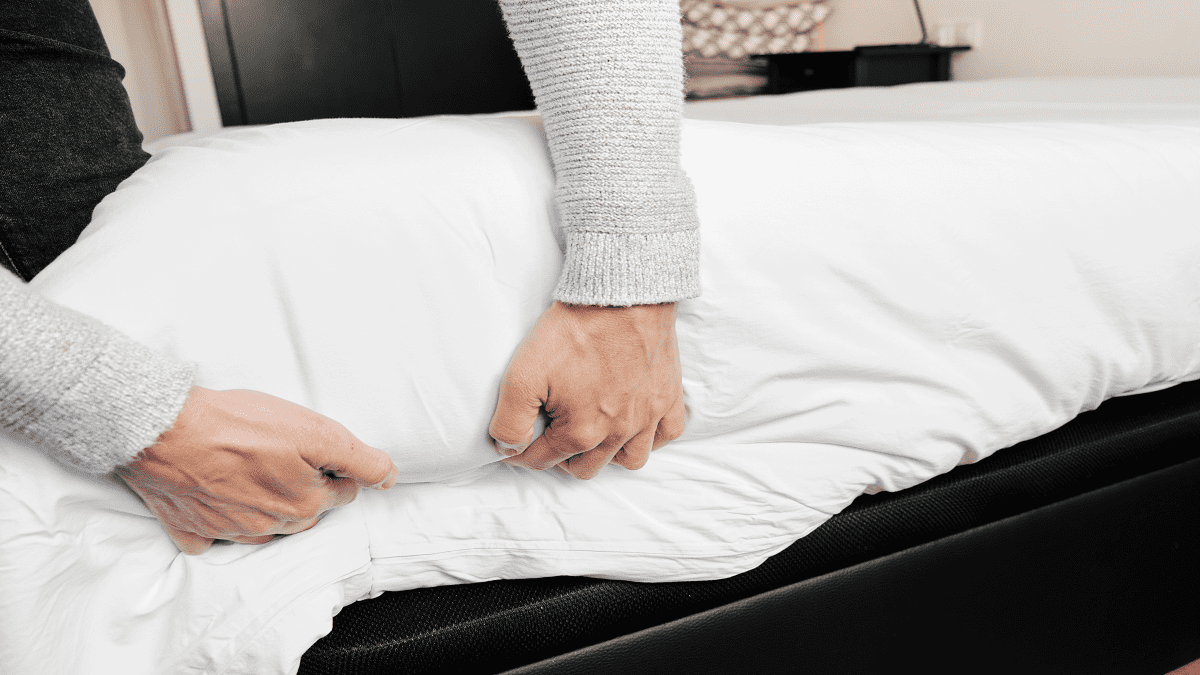In the hustle and bustle of our daily lives, the simple act of changing bed sheets can often be overlooked. However, the frequency with which you refresh your linen can impact not just the quality of your sleep, but also your overall health and condition of your skin.
How often should you change your bed sheets?
Experts recommend changing your bed sheets at least once every two weeks to maintain a healthy sleeping environment. You spend a third of your life in bed so it can become a breeding ground for bacteria, dust mites, and allergens. The accumulation of these microscopic intruders can lead to a variety of health issues, ranging from allergies and respiratory problems to skin irritations.
Here are some health hazards that could come from not washing your sheets and some tips to keep your bed clean.
Effects on your skin
One of the most immediate effects of neglecting your bed sheets is the toll it takes on your skin. The human body sheds millions of skin cells every day, and a significant portion of these end up on our bed sheets. When left unchanged for an extended period, these cells can mix with sweat and natural body oils, creating a fertile ground for bacteria. This, in turn, can lead to acne, skin irritation, and even exacerbate existing skin conditions.
Dust mites
You might not see them, but your bed could be teeming with unwanted guests. Dust mites thrive on dead skin cells, especially in the warm, cosy environment of a well-used bed. These microscopic critters are a common trigger for allergies and asthma, and their presence can exacerbate conditions such as eczema. To keep these pests at bay, it’s recommended to wash your bedding in hot water weekly.
Pet dander
If you enjoy snuggling your pet at night, it’s important to remember that they can contribute to the build-up of dander and hair in the bed. This not only provides more food for dust mites but also increases the risk of skin irritations and fungal infections such as ringworm. Regularly washing your sheets can help minimise these risks.
A breeding ground for bacteria
All bodies naturally excrete fluids such as sweat and saliva, which can soak into your bedding. Over time, this can create a perfect environment for bacteria to flourish. Shockingly, lab tests have found that swabs from pillowcases unwashed for a week harboured 17,000 times more colonies of bacteria than samples taken from a toilet seat.
This bacterial build-up can lead to acne breakouts and other skin issues. If you suffer from acne, changing your pillowcases every two to three days and washing your sheets weekly can help keep your skin clear and healthy.
Illness and infection
If you’ve been sick, your bed can become a reservoir for lingering germs. Viruses and bacteria can survive on fabrics for varying lengths of time, potentially leading to reinfection. For example, flu viruses live on tissues for just 15 minutes, but some stomach bugs can survive on fabrics for four hours. Washing your sheets immediately after an illness is a simple step to help stop the spread of germs.
Check your pillow
Your pillow isn’t immune to these issues. Fungus and other allergens can accumulate within the stuffing, posing risks, especially to those with respiratory issues such as asthma. If your pillow can be washed, wash it twice a year. Follow the washing instructions on the care label and ensure it’s rinsed and dried well to prevent any mildew growth. If your pillow can’t be washed, use a pillow protector and wash that along with the pillowcase.
When to change your sheets more often
Certain habits can necessitate more frequent bedding changes. If you sleep nude, snack in bed, have young children sharing your bed, or sweat excessively at night, consider stripping your bed at least once a week.
Let your bed breathe
While making your bed might be a morning ritual, allowing your sheets to air out can help evaporate moisture and make your bed less inviting to mites and bacteria. So, take a moment before tidying up to pull back the covers and air your bed out.
Effective washing tips
When laundry day arrives, use the hottest water setting recommended on your bedding’s care label. Heat from a dryer can also help eliminate any germs that survive the wash cycle. For an extra level of cleanliness, consider using bleach or a similar germ-killing product, particularly after an illness. And don’t forget to keep your washing machine clean.
Don’t forget the extras
Items such as comforters, duvet covers, and mattress pads also require regular cleaning, though less frequently than sheets. Check the care labels and establish a cleaning schedule to ensure all aspects of your bedding are fresh and hygienic.
Wash comforters and blankets every one to two months. The same applies to duvet covers if you use a top sheet, if not, wash it when you wash your sheets. Mattress pads need to be washed four times a year. If you have a bed skirt, pop it in the machine every three to six months.
Not only do clean sheets contribute to a pleasant and inviting bedroom atmosphere, but they also play a role in your health. By adhering to a regular washing schedule and being mindful of the factors that can contribute to a less-than-pristine sleeping environment, you can enjoy a healthier, more restful night’s sleep
How often do you wash your sheets? Do you wash them on a specific day? Let us know in the comments section below.
Also read: How often should you wash your pyjamas?
Disclaimer: This article contains general information about health issues and is not advice. For health advice, consult your medical practitioner.

